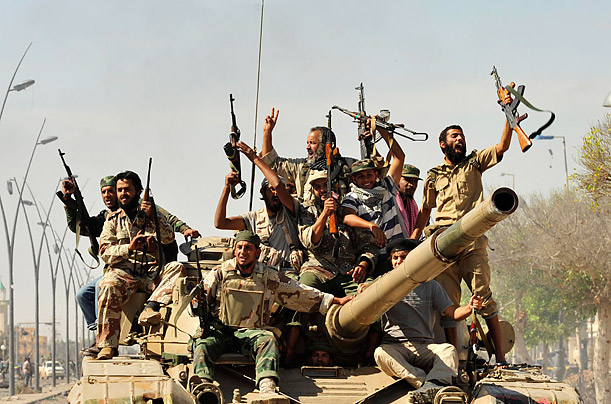-
Five Years on: the US-NATO Destruction of Libya Continues

Five years ago, on Feb. 15, 2011, a war was launched against a project of global significance, which will remain in history as the Libyan Jamahiriya. Libya had shown the international community that there were alternatives to capitalism as a path of development, even after the collapse of the Soviet Union. This model of development that were based on the principles of social justice was unacceptable to the West and was a primary cause of the outbreak of war in 2011.Today, five years after the collective aggression of the US, other NATO countries, and many Arab states, the results of that war are evident: the Libyan state is a total loss and there are no visible prospects for any kind of development. Libya is no longer a state. It is a land of chaos. A land that has had no government for five years. A land from which weapons continue to flow into the region. A land where Daesh (the Islamic State) sells oil from captured oil fields and refineries. A land that acts as a way station for migrants and a hub for human trafficking. For example, the Libyan city of Sirte has been transformed into a base for Daesh. Having united with the local al-Qaeda affiliate and the group Ansar al-Sharia, it is now a center for Daesh’s efforts to recruit young people.
On Dec. 17, 2015 most of the political factions that had agreed to take part in UN-brokered negotiations came together in the city of Skhirat (Morocco) to sign a peace agreement. But far from all the forces in Libya were present, and only one political leader – who is no longer with us – knew how to bring them to heel. Thus on Dec. 23 the UN Security Council was forced to adopt resolution 2259, supporting the signing of the agreement and recognizing the state that will be created on its basis.
One can only imagine what the forces that refused to take part in those negotiations think about this recognition. Recognition by individual institutions in Libya will be no less difficult to achieve. For example, paragraph 9 of resolution 2259 asks the National Oil Company, the Central Bank of Libya, and the Libyan Investment Authority to accept the authority of the Government of National Accord. That is a highly unusual addendum, but one must keep in mind a few details that are specific to the situation in Libya today: members of armed groups in Libya are paid through… the Central Bank of Libya!
Simultaneously with the negotiations in Morocco, another event took place in Rome. Representatives of the two main «governments» from Tripoli and Tobruk signed an agreement on Dec. 13 intended to form a national unity government.
The situation in Libya is formally under the control of the UN: an embargo has been introduced on supplies of oil and weapons. But neither embargo is being respected.
The absence of a government that can effectively control the entire country has led to Libya’s losing its vote in the UN General Assembly. It was recently decided that in order for Libya to regain its UN vote, it must first get out of debt, through a minimum payment of $1.5 million…
The International Criminal Court also needs to formally take up the issue of the Libyan situation. Despite the fact that the situation in Libya was referred to the ICC back in February 2011, over the past five years nothing has been done to investigate the mass crimes that are being committed there. Within a few weeks of that time, accusations were made against Muammar and Saif Gaddafi, as well as against the head of Libya’s security service, Abdullah al-Senussi. Of course, no serious investigations were conducted. Without due process, the leaders of a stable and flourishing state were labeled international criminals.
Muammar Gaddafi’s case was «closed» after his murder, although in any court this murder would serve as the basis for opening a new case.
Nor does Fatou Bensouda have much interest in the case of Saif Gaddafi. Of course she regularly and formally «expresses concern» that Saif Gaddafi has still not been moved to The Hague, but the truth is if Saif did end up in the ICC she would have to coach some false witnesses to offer evidence supporting the false accusations. Saif Gaddafi is still held in Zintan after having been sentenced to death. The Libyan government has stated that Saif Gaddafi’s death sentence cannot be carried out in Libya, since it was pronounced in absentia, and thus the accused is entitled to a new trial after he is moved from Zintan and handed over to Libyan authorities. Libya has confirmed that Saif Gaddafi is not in custody within its borders. However, this response only emphasizes that those who call themselves the «government» of Libya do not in fact control anything at all.
Nor does the International Criminal Court want to examine the case against Abdullah al-Senussi. This time it did not hide its reluctance: it stated, that the ICC is the final court of appeal and it will accept the case only if the Libyan judicial system is non-functional. The ICC has come to an astonishing conclusion – the Libyan judicial system is capable of conducting a fair trial and ensuring all international legal protections! This is an interesting conclusion, given the lack of a judicial system in Libya per se. All this is happening against the backdrop of published videos showing scenes of the torture to which Saadi Gaddafi has been subjected inside Al-Hadba prison. There have also been reports of al-Senussi being tortured. According to the ICC prosecutor, these reports are being carefully «investigated»…
In her tenth and most recent report on the investigation of the situation in Libya, ICC Prosecutor Bensouda asserts that there are grounds for opening new cases, in particular with regard to crimes being committed by local armed groups, soldiers from the Libyan army, and extremist groups. However, all the crimes against civilians committed during the NATO bombing have been entirely «forgotten».
For the five years that the ICC has been involved in the Libyan situation, the prosecutor has not conducted a single investigation or filed any charges against those who have destroyed that country. The International Criminal Court has simply been used as a weapon of war against Libya. The ICC’s sabotage of the investigation of crimes in Libya is now a form of direct support for those who first razed that country to its foundations, and who now welcome that devastation and will not allow the country to begin rebuilding.







Login or Register to Leave a Comment